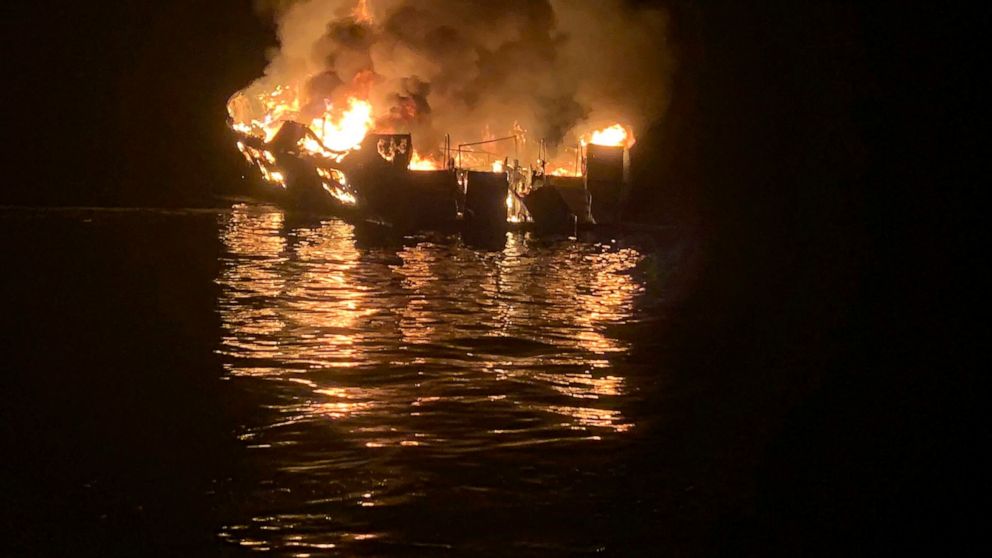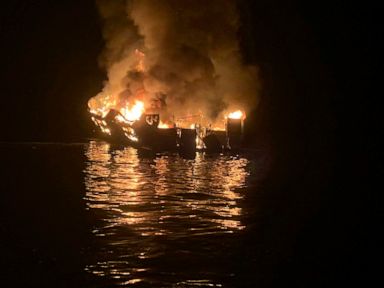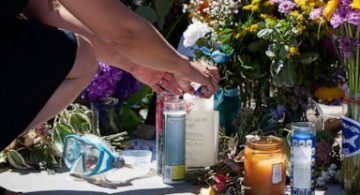
Dozens of people trapped on a scuba diving boat that caught fire off the Southern California coast appear to have died from smoke inhalation, not burns, authorities said Friday.
The 34 people were trapped in a cramped bunkroom below the main deck of the Conception after the fire broke out around 3 a.m. Monday and quickly engulfed the boat.
Preliminary findings on the causes of death, announced by Santa Barbara Sheriff Bill Brown, raise the possibility the victims inhaled highly toxic smoke and died in their sleep before being scorched by flames that burned their bodies beyond recognition.
“The indicators are from the preliminary examination of the bodies that the victims died prior to being burned,” Brown said.
The revelation came as investigators continued to search for the cause of the deadly blaze, divers looked for the body of the one missing victim. Late Friday afternoon the Coast Guard said safety concerns over the weather halted efforts to salvage the dive boat.
While local, state and federal agencies try to solve the mystery of what doomed the dive boat, the probe has not taken a criminal turn, Brown said, though he said that was a possibility.
Under federal law known as the seaman’s manslaughter statute, a captain or crew member can be charged with a crime if their negligence or misconduct results in death.
Laurie Levenson, a former federal prosecutor who is a professor at Loyola Law School, said it’s too early to discuss charges.
“There are lots questions to answer, including what even constitutes negligence. In other words, do you have to have somebody on watch, enough fire extinguishers or ways to, you know, get out — enough exits?” Levenson said. “Certainly if they find out there was negligence or misconduct this is a possibility, but it’s too soon.”
Twenty-three of the 33 bodies recovered have been positively identified through DNA, and their family members around the world are being notified, Brown said.
Next of kin have been tracked down as far away as Singapore, Japan and India.
Brown said the cause and manner of death was being determined through external exams and not traditional autopsies. Final results will depend on toxicology tests.
Dr. Howard Robin, an expert in forensic pathology, said it’s hard to know how the people died without an autopsy, but said it’s possible they died in their sleep from carbon monoxide poisoning.
“You don’t know if they suffered or not,” Robin said. “I would think if there’s a fire and they were breathing in the carbon monoxide, there would soot, and then there would be a cough and … then they would wake up.”
Robin said the lack of autopsies could present a challenge during any lawsuits brought by family members because those results are typically used to support damages for pain and suffering.
The owner of the boat, Truth Aquatics Inc., pre-emptively filed a lawsuit Thursday under a pre-Civil War provision of maritime law that could protect it from potentially costly payouts to families of the dead, a move condemned by some observers as disrespectful and callous.
The company said in a statement posted Friday on Instagram that the litigation is an “unfortunate side of these tragedies” and pinned the action on insurance companies and other so-called stakeholders.
“This wouldn’t be something that we as a family would even consider,” the company said. “The timing is on them. Our hearts and minds are on the tragedy and finding answers.”
Coast Guard records show the boat passed its two most recent inspections with no safety violations. And previous customers said Truth Aquatics and the captains of its three boats were very safety conscious.
Five crew members jumped overboard after trying to rescue the 33 scuba divers and one crew member whose escape routes were blocked by fire, federal authorities and the boat’s owner said. The crew, including the captain, said they were driven back by flames, smoke and heat.
They jumped from the bridge area to the main deck — one breaking a leg in the effort — and tried to get through the double doors of the galley, which were on fire.
That cut off both escape routes from the sleeping quarters: a stairway and an escape hatch that exited in the galley area. The crew then tried, but failed, to get into windows at the front of the vessel.
Captain Jerry Boylan stayed aboard trying to send radio distress calls and was the last one in the water, said Glen Fritzler, co-owner of Truth Aquatics Inc. of Santa Barbara.
“The other crew at a certain point when the flames had engulfed the boat and they were in the water, they could see Jerry jump from the upper deck, a long jump. And there was a trail of smoke following him. They thought he was on fire,” Fritzler told KEYT-TV in Santa Barbara.
“Within minutes, they would’ve been consumed,” he said. “So they did their best. They did re-enter the vessel from the back of the boat after they swam around it. They could not get to firefighting equipment because everything was engulfed.”
Fritzler said the experience has traumatized the survivors.
“They’re breaking down,” he said. “They’re seeking counseling. It’s a very tough time for them.”
———
Melley reported from Los Angeles. Associated Press writer John Antczak in Los Angeles contributed to this story.





